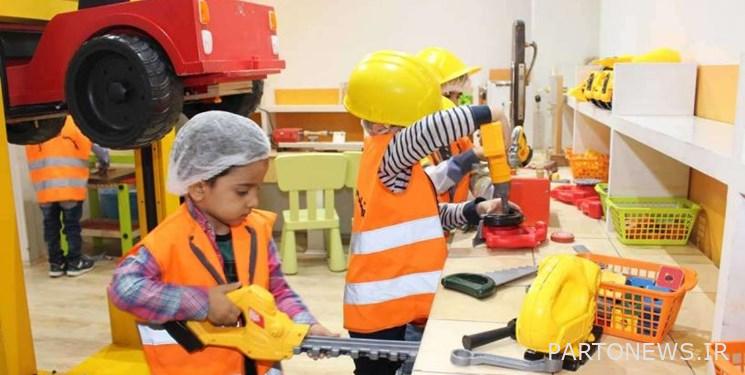What do you want to do? / How can we help our child choose a job?

Life group: What would you like to do? Do not say we did not ask! All the parents or relatives have asked this frequently asked question to the children. Choosing a job is one of the most important challenges that parents face. Maybe you already have a teenager who is in the most important stage of education, which is choosing a field, and you would like to help him, but you do not know how? This guide will come in handy. If you want to work on your child’s mind from childhood and see what job he is interested in but you do not know the solutions, it is not bad to review the recommendations of economic education consultants.
* From the age of fantasy and hesitation to realism
First of all, it’s not bad to know that we are all going through several periods of career growth. “Goddess Rivandi”; “Psychologists believe that young people go through several periods of career development,” the economic education expert told Fars. The first period that forms in childhood is the “imaginary period” that we have all gone through. In the imaginary period that occurs in early and mid-childhood, children become aware of their career choices by daydreaming. Children’s choices in childhood are usually influenced by relatives and the glamor and excitement of jobs and have little to do with the decisions they make in adulthood.
The “hesitation period” is the next period that begins between the ages of 11 and 16. During this period, adolescents think about jobs in a more complex way. At first, they think of a job based on their desires, but later, when they become aware of the essential requirements for each job, they become interested in a job based on their abilities and values.
The next period is the “period of realism” that forms in late adolescence and early 20s and 30s, and in this period when the financial and practical realities of adults are revealed, young people limit their career choices.
In short, few young people know from an early age what they want to do and follow a direct path to a career goal. Some make decisions first and then change their minds, and some remain indecisive for long periods of time. All of these steps are normal in the growth process and parents do not have to worry too much.
“Students usually have more time to explore different options, but the living conditions of many young people with low social and economic status make their choices more limited.”
* How to help our child choose a job?
Now, with all these circumstances, how can parents help their children to choose a job?
You may be able to help your child better after reading the economic education expert tips. “Pay attention and see what areas your child is most capable of among his or her peers,” says Rivandi. What activities does he do better and sooner than others? We have to work on all of our child’s talents. Some we have to strengthen but some we have to flourish. “Draw a line around ethnic and tribal prejudices and ancestral occupations, and let your child pursue his or her own abilities and interests.”

* Use Nowruz visits
The next step is to try to get the information you need about different types of jobs so that you can help your children better. “Now that it is Eid and the visiting market is hot, you can get guidance from relatives and acquaintances in any job to tell you and your child about the hardships and benefits of that job,” says Rivandi. The next point is to introduce your child to different types of jobs from an early age. For example, you can take your child to carpentry or various shops and get acquainted with different types of businesses. This will allow your child to understand the job in a tangible way.
Remember that job satisfaction has many factors, not just financial issues that bring job satisfaction. “So try not to focus only on financial issues.”

* Be aware of the expiration date of some jobs
When you are watching your child’s circumstances and interests, do not miss an important point. “Be aware that many jobs will be lost in the future, so try to prepare your children for jobs that will be needed more later, but do not impose anything,” says Rivandi. “For example, now everything is being computerized and artificial intelligence has become very important, so be careful and see what jobs will be created in the future or on the stock market.”

* Pay attention to the needs of the region
When choosing a job or starting a business, be aware of what job needs exist in your area or city. For example, you are close to the sea and your child is also interested in the world of fish, so he can be successful in fishing or, for example, you live in a mountainous area. So the most important way to find good business ideas is the needs of the area in which you live.
* Which living language of the world should my child learn?
If the child is interested in a job, he must be more creative in it and he can do it in a way that he is not like everyone else. This point is made by the economic education expert and he continues: “In spite of all this, the labor market of a job must also be considered. “For example, there are a lot of people who know English now. In fact, there are a lot of suppliers, but there may not be that much demand, but Chinese is not like that, so maybe there is a better job market.”

Get acquainted (gain, obtain) with present-day techniques that came from Job Tests
The economic education expert concludes by pointing out some job talent tests. “There are a number of psychological tests for job aptitude that you can use,” says Rivandi. Gardner’s theory of eight intelligence, MBTI personality typology test, Holland test, professional currency assessment test, work style evaluation test. “By doing these tests, you can find out what job talent your child has.”
End of message /
You can edit this post
Suggest this for the front page

